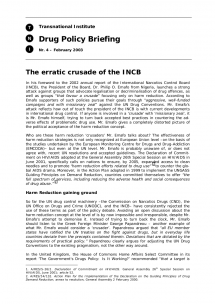Ideas into movement
Boost TNI's work
50 years. Hundreds of social struggles. Countless ideas turned into movement.
Support us as we celebrate our 50th anniversary in 2024.

In the Report of the International Narcotics Control Board for 2002 that was released on February 26, the president of the Board, Dr. Philip O. Emafo from Nigeria, launches a strong attack against groups that advocate legalisation or decriminalisation of drug offences.

In his foreword to the 2002 annual report of the International Narcotics Control Board (INCB), the President of the Board, Dr. Philip O. Emafo from Nigeria, launches a strong attack against groups that advocate legalisation or decriminalisation of drug offences, as well as groups “that favour a crusade” focusing only on harm reduction. According to Emafo supporters of such policies pursue their goals through “aggressive, well-funded campaigns and with missionary zeal” against the UN Drug Conventions. Mr. Emafo’s attack reflects how out of touch the president of the INCB is with current developments in international drug control. If anyone is involved in a ‘crusade’ with ‘missionary zeal’, it is Mr. Emafo himself, trying to turn back accepted best practices in countering the adverse effects of problematic drug use. Mr. Emafo gives a completely distorted picture of the political acceptance of the harm reduction concept.
Who are these harm reduction ‘crusaders’ Mr. Emafo talks about? The effectiveness of harm reduction strategies is not only recognized at European Union level –on the basis of the studies undertaken by the European Monitoring Centre for Drugs and Drug-Addiction (EMCDDA)– but even at the UN level. Mr. Emafo is probably unaware of, or does not agree with, recent UN resolutions and accepted guidelines. The Declaration of Commitment on HIV/AIDS adopted at the General Assembly 26th Special Session on HIV/AIDS in June 2001, specifically calls on nations to ensure, by 2005, expanded access to clean needles and to promote “harm reduction efforts related to drug use” 1 to counter the global AIDS drama. Moreover, in the Action Plan adopted in 1999 to implement the UNGASS Guiding Principles on Demand Reduction, countries committed themselves to offer “the full spectrum of services, including reducing the adverse health and social consequences of drug abuse.”
Pages: 4